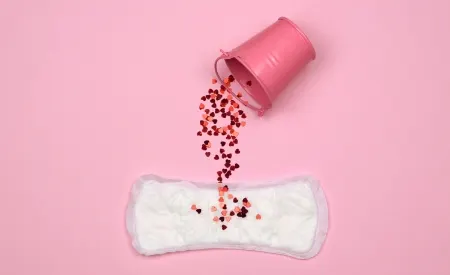Can you swim while on your period? Top tips & instructions

Heading for a beach vacation or a day at the poolside? Sounds fun! But wait, did your monthly bleed just decide to come along at the last minute? In such a situation, the very first question that might pop in your head would be “can I swim while on my period?” Well, the answer is yes, you definitely can! You just need to use the right menstrual products like tampons which hold your flow and allow you to go swimming on your period. In addition to it, we’ve found answers to the seven common questions revolving around how to swim on your period. So, keep on reading to learn more!
- Can You Swim On Your Period With A Pad?
- Can You Swim With A Tampon?
- Can You Catch Infection While Swimming On Your Period?
- Can The Water Pressure Stop My Period When I Swim?
- Can Swimming Make Cramps Worse?
- Can Period Blood Attract Sharks?
- When Should You Avoid Going To Swim While On Period?
- Tips for Swimming on Period

1. Can You Swim On Your Period With A Pad?
Most of us tend to use sanitary pads during our menstrual cycle. But if you are wondering ‘can you swim on your period with a pad?’ Then here’s what you need to know – the short answer is no! Your sanitary pad would absorb the water present around you and would leave you with an icky mess down there.
2. Can You Swim With A Tampon?
Consider tampons to be your go-to menstrual care product when it comes to swimming while on period. They are designed in a way to sit high up in your vagina and absorb the menstrual discharge before it leaves the body. Using tampons for swimming can help you prevent leakage and keep you fresh as you swim. You can opt for any tampon but one with the highest absorbency can be quite beneficial while swimming. Try out the ALWAYS TAMPAX Compak Tampons which have innovative absorption channels. It locks the discharge and holds it for a longer time. Likewise, its protective skirt eliminates the risk of leakage. If you are new to using tampons for swimming, then click here to learn how to insert a tampon. Additionally, make sure to change your tampon as soon as you come out of the water to prevent any kind of infection.
3. Can You Catch Infection While Swimming On Your Period?
It’s not necessary that you can catch an infection while swimming on your period. However, there are chances that the polluted water can lead to urinary tract infection or cause irritation down there. Thus, it’s always the best idea to change your tampons as soon as you step out of the water.
4. Can The Water Pressure Stop My Period When I Swim?
At first, it may feel like your period flow has stopped but the reality is different. Chances are that your flow might have reduced a little. It’s due to the water pressure which is placed against your vagina. This might hold your blood from coming out on a temporary basis. All you need to know is that your period blood is still flowing but only at a slower rate.

5. Can Swimming Make Cramps Worse?
Quite the contrary, swimming being a low-intensity exercise can actually help you ease the discomfort caused by the cramps. As you exercise, your body releases endorphins which fights the pain. Additionally, there’s a study that suggests women dealing with PMS can ease their symptoms by regularly exercising. So, taking that dip would be beneficial for you after all!
6. Can Period Blood Attract Sharks?
People believe that period blood attracts sharks which isn’t true at all. When you menstruate, your body expels 5-6 tablespoons through your entire cycle. Considering this number, you would expel a small amount of blood which would be untraceable for the sharks. So, be rest assured that sharks won’t be meddling with your swim time.
7. When Should You Avoid Going To Swim While On Period?
If you recently had a procedure on your vagina like a hysterectomy then it's best to not take that dip. Similarly, if you had a baby recently or are recovering from a miscarriage, staying away from the pool or ocean is a good idea. There are increased chances of contracting a vaginal infection through the water in such water bodies.

Tips for Swimming on Period
Apart from caring down there, you need to think about the other signs that come along with your periods. Here are some additional tips for you:
1. Take good care of your skin
Acne, pimples and breakouts are a usual part of periods. While heading to the beach or pool, make sure to apply a generous amount of sunscreen and moisturizer. Protect your skin as it is going through some sensitive times.2. Ease the cramps and bloating
Dealing with period bloating and cramps can be quite stressful. To curb this issue, try staying away from oily, salty or any kind of unhealthy foods. Click here to learn which foods to avoid during periods.3. Stay hydrated
While you are at the beach, drink lots of water (not sea water), herbal iced tea or some cool refreshing lemonade.Takeaway
Remember that if you have your trusted tampons for swimming by your side, then you have nothing to worry about. Go and take that dip stress-free. Only thing to keep in mind is to change your tampons after swimming to keep infections at bay. Another way to enjoy your swimming plans is by staying ahead of your periods with our period calculator which analyses your cycle and estimates your next period.
FAQs
1. How to swim on your period?
Swimming while on period requires you to use the best menstrual products which includes tampons. Placing them perfectly in your vagina is quite important to avoid any leakage. When it comes to a tampon, the highest absorbency can do the trick for you.2. Can you swim on your period without a tampon?
No, you cannot swim on your period without a tampon. Using tampons for swimming is the most easy and convenient way to stay away from leakage. As tampons are placed inside your vagina, they absorb the menstrual discharge way before the blood gets time to come in contact with the water.3. Should a tampon feel uncomfortable at first?
No, you cannot swim on your period with a pad. As a pad is made up of absorbent materials, it tends to soak up the water easily. This leaves no room for your menstrual discharge to get soaked up. Thus, it’s not a good idea to wear a pad while going for a swim.Disclaimer:
Please note the date of the last review or update on all articles. No content on this site, regardless of date, should ever be used as a substitute for direct medical advice, diagnosis or treatment from your doctor or other qualified clinician. Always is committed to ensuring that all of our products meet rigorous safety standards; Always pads prioritize safety, protection and comfort of its consumers.




